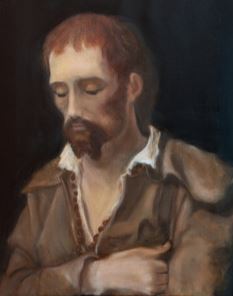Today we share two significant reflections. One for the final day of Passover by Michael Pitkowsky in our Admissions Office and then other by Joel Warden, Ph.D. our Catholic Scholar in Residence. Both posts invite us to consider the importance of being connected to loved ones as well as the significance and sadness attached to being apart. Rabbi Pitkowsky reflects on this by inviting us into prayer along with Dr. Warden’s offer of easing the spirit. We hope you enjoy both of today’s pieces.
---
The Passover Seder meal, which is the most widely observed ritual by Jews around the world, includes many different customs, some new and some old. One custom is to describe how Jews in other historical periods and lands have celebrated Passover, essentially incorporating past Seders into our own. I remember how as a child we talked about Jews who in the face of danger and oppression celebrated Passover. How when it seemed that there was no hope and no freedom, they showed that the belief in a day that could be better than today couldn’t be extinguished. I have no doubt that the descriptions of how Jews around the world are observing Passover this year will become a part of future Passovers. We will retell how at the time of a pandemic Jews celebrated the holiday without family and friends, sometimes even all alone.
This separation from family and friends is diametrically opposed to a teaching found in the Haggadah that says: “Let all who are hungry come and eat. Let all who are in need come and share in the Passover meal.” While our Seder table is usually filled with family, friends, and guests, this year only one of our children will be with us and our parents will be joining us remotely. In the face of this reality how should I understand this line from the Haggadah? This year I’ll choose to read it as an aspiration and prayer. As slaves we were unable to host others, but now we are free to open our homes. Even though this year no one will be joining us, we will still announce that we aspire to have our table filled with guests, praying that soon we will once again be able to open our doors to others and have them join us in the Passover meal.
Michael Pitkowsky
Manager of Enrollment Analytics
---
Happy Feast of Blessed Benedict Joseph Labre! This Third Order Franciscan was born in 1748 and cared for plague victims in his home town in France before moving to Rome and living a life of simplicity and pilgrimage. He subsisted on the generosity of others, was attentive to the needs of other folks who inhabited the empty spaces surrounding the Colosseum with him and performed miracles of healing for the sick. He died on April 16, 1783 at the age of thirty-five and is the patron saint of the homeless.
By coincidence (or providence) today, April 16, is also National Healthcare Decisions Day. Through their ongoing "Conversation Project," the group which established this annual event provides resources to facilitate what may be awkward -- but is always important -- dialogue between and among the sick and other loved ones about what their most important healthcare desires might be.
I've been teaching classes in Medical Ethics at St. Francis College for the last couple of years. In those classes we spend a lot of time talking about these kinds of conversations, documents, and ethical underpinnings that inform healthcare providers' actions on behalf of the sick and dying.
These kinds of conversations can take place on any day, not just on April 16th. But maybe today it would be worth checking out the materials provided at http://www.conversationproject.org/. Some advance planning documents (often referred to as "advance directives") can be complicated and may even require an attorney or legal process to execute. But one document that's easy to complete is a Healthcare Proxy form. By this you name someone who will make important healthcare decisions on your behalf if you can no longer make them for yourself. It's a one-page form and need only be witnessed by two people, no lawyer needed.
For more information, questions/answers, some good practical advice and the form to use in New York State, go here: https://www.health.ny.gov/publications/1430.pdf
And if I can be of any help, please don't hesitate to reach out to me.
On this Feast of Blessed Benedict Joseph Labre may the ill and all who care for them know the strength and peace that comes from solidarity with others.
Pax et bonum,
Joel Warden, Ph.D.
Catholic Scholar in Residence
jwarden@sfc.edu
 |
Image of Blessed Benedict Joseph Labre
by Maria Matthia Langone
|

No comments:
Post a Comment